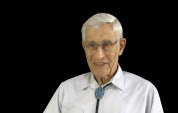4:22 | Army surgeon Quinn Becker didn't know much about Vietnam. As a professional soldier, he didn't weigh whether it was right or wrong. He had a job and he went to do it. Assigned to an evacuation hospital in Phu Bai, he had a memorable arrival by helicopter.
Keywords : Quinn Becker doctor surgeon Vietnam Walter Reed National Military Medical Center communism Phu Bai helicopter Vietnamese

Quinn Becker's father was a country doctor and he decided that was the field for him as well. After medical school at LSU he took a regular Army commission because he was DMS, Distinguished Military Student, of the campus ROTC. Orthopedic surgery became his specialty and he began to think about an Army career.
As Quinn Becker advanced in the ranks as an Army doctor, he had two assignments in Germany dealing with readiness and training for medical operations there. He then went to Walter Reed where he was surprised at the number of casualties from Vietnam and the severity of their cases.
It was just like the show MASH, says Army doctor Quinn Becker. He served as a surgeon at an evacuation hospital in Vietnam where it was not unusual to operate for eighteen hours straight. There was also a tremendous physical and mental strain on the young nurses, who had volunteered to come help take care of the troops.
His second assignment in Vietnam was the command of a medical battalion for the 1st Cavalry Division (Airmobile.) Quinn Becker was an orthopedic surgeon but his main job there was to manage the fleet of Medevac helicopters and their crews. Their ships had a feature that other units did not have, machine guns.
Quinn Becker was the medical battalion commander but he was also a surgeon. He describes a heart wrenching experience in the operating room regarding a man he had sent to the field earlier in the day. A lot of the injuries treated there in Vietnam were caused by booby traps and there were also a lot of gunshot wounds through extremities.
Quinn Becker describes the primitive sterilization units he used in Vietnam at an Army hospital. Smokey Joes, they called them. It was a demanding environment for medical personnel who were tasked with quickly getting casualties off the battlefield and into care and treatment.
He felt like a whipped dog when he returned from Vietnam. Quinn Becker couldn't wear his uniform and he practically had to sneak in at night. The next assignment for the Army surgeon was at Tripler Army Medical Center in Hawaii where he met a most remarkable young man who was severely wounded.
A lot of good people fought and died in Vietnam and we have to take care of our veterans who served there. That's the message from LTG (Ret) Quinn Becker, who saved some of them as a surgeon. He recommends you read the book A Different Face Of War written by another Medical Services officer who was an advisor there.
Army surgeon Quinn Becker almost retired but he was selected to attend the War College. That usually meant they were grooming you for higher up. As he moved up to higher commands, he set out to modernize antiquated field medical equipment, a need he had first noticed years before.